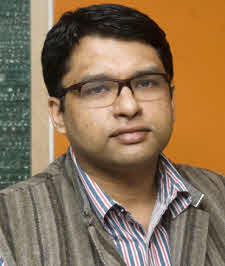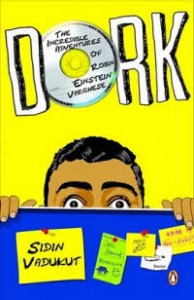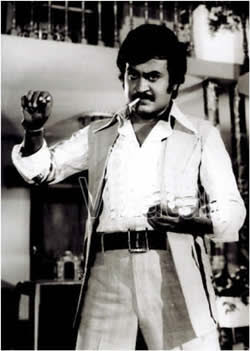Interview by Anupama Krishnakumar
[box]In a peppy interview to Spark, Sidin Vadukut, Author, talks about himself, his writing and book, humour and much more. Don’t miss this interview. It’s sure to leave you smiling! Interview by Anupama Krishnakumar.[/box] [box type=”bio”]Sidin Vadukut is the author of ‘Dork : The Incredible Adventures of Robert Einstein Varghese’ published by Penguin in 2010. ‘Dork’ is Sidin’s debut novel and presents a humourous account of life in the management consulting industry. Sidin did his engineering from NIT, Trichy and MBA from IIM-Ahmedabad. He is now managing editor with Livemint and writes the weekly column Cubiclenama. Sidin also blogs at Domain Maximus (www.whatay.com). [/box] There’s humour underlying much of your writing, including your first book. But, honestly, when I look at your photograph, you look like the serious types. Are you? 🙂
There’s humour underlying much of your writing, including your first book. But, honestly, when I look at your photograph, you look like the serious types. Are you? 🙂
I would think so. In real life I don’t think I am particularly jovial or social. I try to avoid most social obligations and would rather email or text people than talk to them or meet them. But once I warm up to people I think I am not averse to a few jokes. I find being funny way less tiring than being serious.
But increasingly I find myself become more and more subject to house arrest. Ever since the book has come out, I don’t think I’ve had too much time to read or write. This could be one reason. But then, I’ve always been someone who is perfectly happy to go watch a movie, have dinner, get a drink and then come
back home all on my own. My wife finds this most disturbing.
A shift from being a management consultant to a full-time writer. How did that happen? Was your blog a large part of this transition?
I think I decided to try writing soon after engineering college. But I wasn’t sure in what form to do this. Moreover, I should be committing to the writing profession to depth. The blog played a huge role to the extent that it got me my first few writing gigs, and it gave me the confidence that there was some form of audience for my style of writing. Further, it really made that transition from office to newsroom much more easier.
Do you think you have grown more popular after you became a writer? How does your wife handle all the attention that you may be getting, particularly from girls? 🙂
Of course. I wouldn’t use the word popular. But I think a lot more people know I exist. The poor wife has so much to handle. But I think we have an understanding about such things. We’ve been married for a while now. There are no insecurities though I still notice the occasional frown when Gul Panag comes up in conversation. Gul was a guest at my book launch, along with Samit Basu, and we’ve been in touch since. I can neither confirm nor deny any other rumours or whisperings.
Tell us a little bit about your experiences with writing ‘Dork’. The jokes in particular – did they occur to you as and when you wrote? What inspired you to take up this theme? Did the story turn out just the way you had planned it to be?
when you wrote? What inspired you to take up this theme? Did the story turn out just the way you had planned it to be?
Writing Dork, as I think is writing any book, is a mix of experiences. The writing itself is actually quite troublesome. You need to stick to a daily routine, churn out a certain number of words every day and stay focused on the plot and the process. This is actually quite challenging.
But the planning and conceptualizing was sheer delight. So often, I would be pining to run back from office and pen in a funny scene or dialogue.
A lot of the jokes occured to me independently of the writing process. A certain scenario or situation suddenly would pop into my head. And I would write it down somewhere. Later I would incorporate it into the plot. Others happened while I was writing the book itself. So a mix of both. I’d say 50-50.
Dork happened largely because I had been writing about office culture for a really long time. So when I decided to write a book, something about the office seemed like a good idea. And because of my work experience I had many, many experiences to reach into.
I am happy with the story. It has many issues of course. By no means is it perfectly written, plotted or paced. But I am reasonably happy with it as a first attempt.
Talking of writing, how easy or difficult it is to write humour?
Tough question. First of all there are so many things that can get in the way. A bad day at work or at home will make you feel miserable and entirely unfunny. But you still need to write humour. This is difficult. Sometimes you just feel mentally worn out. All the jokes feel forced and the lines read awkwardly.
But you just have to soldier on. Over time what helps is two things: a certain mental process that approaches topics differently. And I am sure this is true of most regular writers. Your brain just automatically kicks into form, identifying quirks and absurdities. The second thing is that over a period of time writers develop devices. Humour writers develop humour devices. These could be things like metaphors, certain motifs, characters, and word play that help you push a piece of writing along. All writers have these and you need to work on developing them.
I understand that Dork is going to be a trilogy. Can you give us a sneak peek into what the other two parts are going to be about?
Over the next two parts I want to achieve certain plot angles and develop a few things that went under-developed in the first book. Like relationships and friendships. Also I want to look at more office-y things like business travel.But eventually the idea is to make Robin the CEO of a company. Or worse.
Going ahead, do ‘serious’ stuff feature in your writing plans too? The thought-provoking sorts?
Yes. And I think my experience writing for Mint in my day job is helping here. I enjoy writing serious non-fiction and want to work on this skill. Report more, write more and research more. I have a couple of non-fiction ideas in mind. My ultimate dream is to write a World War II history book based on much research and many travels.
I have read some of your ‘Cubiclenama’ columns in LiveMint, and they are awesome! How do you decide on what you want to write about? What is your focus when you write these articles?
My mandate with Cubiclenama is really quite broad. The idea is to poke fun at the workplace. And give readers some light reading on a Friday.
Usually I decide on topics by going through general themes that are in the news, like BlackBerrys or corporate crime, and finding a link to the office space. Then I develop it from there. Usually that is how it goes.
The focus is simple. Entertain people while connecting somehow with their own lives in the office. It is important to maintain this connect. When readers identify with my scenarios – that is when the column, I think, really works. I love writing it. Great fun.
Anything that you would like to tell our readers to make life more fun? 🙂
Read. There is so much brilliant humour writing out there. And, surprisingly, a humour piece can often skewer an important issue more than any boring op-ed piece.
I love reading anything by Gene Weingarten, Joel Achenbach, Dave Barry, Anand Ramachandran, Aadisht Khanna, Krish Ashok and anything that gets published on McSweeneys.net.
Also stop taking life seriously. If shit has to happen, it will. Might as well have a hoot!
Finally, how does it feel when people interview you? 🙂
It feels great. It means your writing it being taken seriously. It is validation. And it is hugely motivating to keep writing.
And also most interviewers are women. I approve of this highly.
[facebook]share[/facebook] [retweet]tweet[/retweet]




